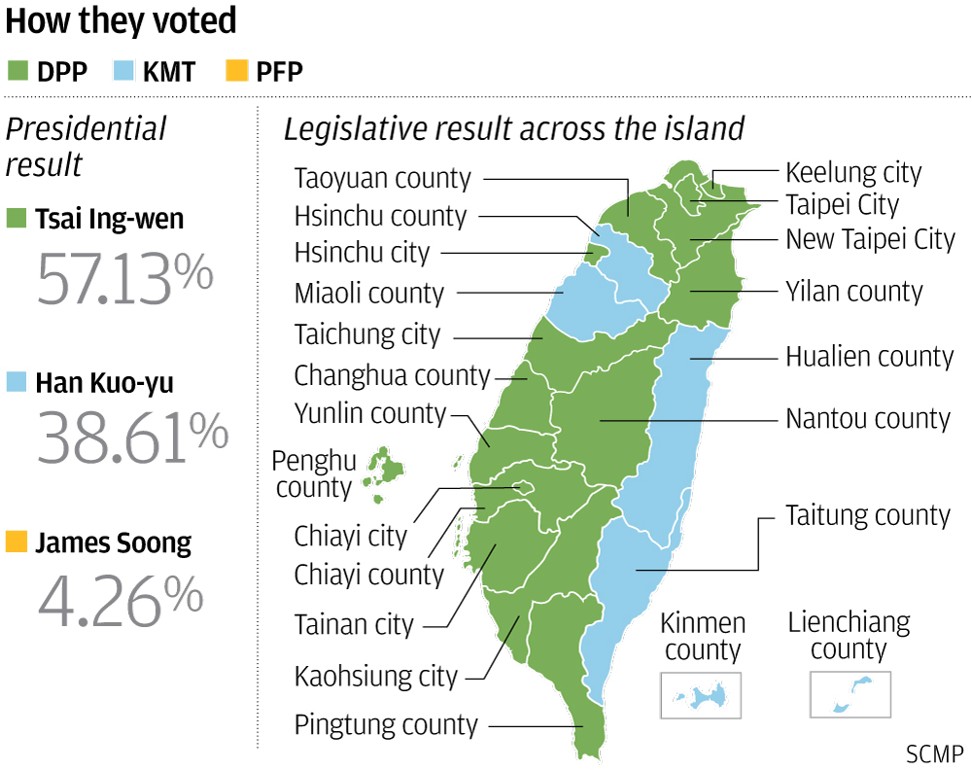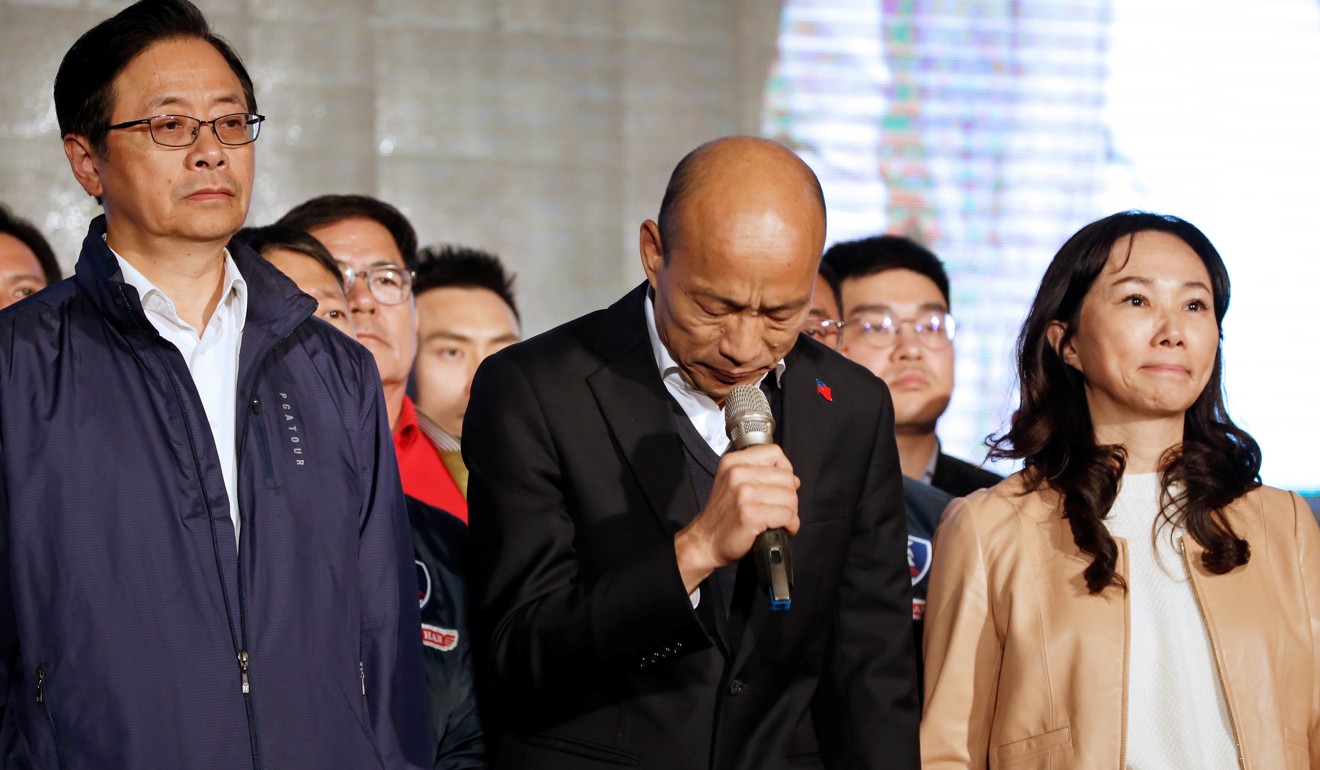
Taiwan elections: Tsai Ing-wen re-elected as president as rival Han Kuo-yu concedes defeat
- Tsai’s approach to mainland China was one of the key issues in the election and the comfortable victory will be seen as a mandate to continue her approach
- US Secretary of State Mike Pompeo congratulates president on re-election
Tsai, from the independence-leaning Democratic Progressive Party (DPP), captured more than 8 million votes, trumping her major challenger, Han Kuo-yu, from the mainland-friendly Kuomintang by close to 3 million votes.
Han, the populist mayor of Kaohsiung, conceded defeat and offered his congratulations to Tsai about an hour after James Soong Chu-yu from the People First Party made his concession speech. Soong garnered less than 600,000 votes, far short of 5.5 million votes received by Han.
Just after 9pm Tsai’s vote total had passed 8 million, more than the 6.9 million she received when victorious in 2016.
The DPP also secured a sweeping victory in the island’s legislative elections, winning 61 seats compared with the KMT’s 38. The result means the ruling party will maintain its majority in the Legislative Yuan.

Analysts said the result would give Tsai a mandate to continue her current cross-strait policy despite the KMT’s disagreements and strong opposition from the mainland.
“Cross-strait issues have been an important topic in the election with Tsai’s critics questioning her ability in dealing with China, but more than 8 million voters have cast their ballots to back her current approach,” said Lai I-chung, chairman of the council for international cooperation at Taiwan ThinkTank.
Tsai has refused to accept the one-China principle since she was first elected in 2016, prompting Beijing – which considers the island a wayward province that must return to the mainland fold, by force if necessary – to stage a series of war games and poach seven allies from Taiwan to try to force her to do so.
“Peace means that China must abandon threats of force against Taiwan,” Tsai said as she declared victory in Taipei.

“I also hope that the Beijing authorities understand that democratic Taiwan, and our democratically elected government, will not concede to threats and intimidation,” Tsai added. She continued that cross-strait relations should be based on “peace, equality, democracy and dialogue”.
Hinting that she would not seek to provoke Beijing in the next four years, Tsai said Taiwan would want to become “partners” and not “issues” for its neighbours.
Tsai did not comment on the protests in Hong Kong but said she believed “friends in Hong Kong would also feel glad [about the result]”.
Chuang Wen-chung, a professor of administration at Shih Hsin University, said the result also showed that the majority of the voters in Taiwan no longer accepted the one-China principle. “This means the KMT will have to develop some sort of new theories in its dealing with the mainland in the future,” he added.
West studies China’s disinformation campaign in Taiwan looking for clues
The KMT had accepted the principle on the grounds that China represents the Republic of China, the island’s official title.
After the result, KMT chairman Wu Den-yi and other senior officials resigned, taking responsibility of the party’s defeat in both the presidential and legislative races.
“Voters have made their choices,” he said. “All the senior executives of the party, including the chairman … will offer their resignation to the central standing committee next week.”

At the DPP headquarters, one of Tsai’s supporters said he had been a bit worried when he saw the number of Han’s supporters was much bigger than Tsai’s at their final campaign rallies, but as the results started to come in he started to feel excited.
“We are very pleased. It’s better than our expectations because Taiwanese have a strong feeling of national demise,” said Tong Chengheng, 43, who works in the finance industry.
This year’s elections have been dominated by issues of national sovereignty, democracy and the relationship between Taipei and Beijing amid accusations of mainland interference in Taiwan and the continuing protests in Hong Kong.
Analysts said Tsai’s campaign had been helped by her message that Taiwan needed to be safeguarded against pressure from Beijing.
Tsai is also thought to have benefited from Han’s gaffes, the perception that he was Beijing’s preferred candidate and disunity within the KMT.
Her re-election is likely to see a heightening of cross-strait tensions, as official ties have been suspended since she assumed office in 2016, ostensibly over her refusal to accept the “1992 consensus” – a political understanding that there is only one China with ambiguity over whether it is governed by Taipei or Beijing.
Ma Xiaoguang, a spokesman for China’s Taiwan Affairs Office, issued a statement late Saturday night saying that the mainland stood by the one-China principle and peaceful unification under the one country, two systems model. “We resolutely uphold our national sovereignty and territorial integrity and firmly oppose any attempt and form of splitting the country,” he said.
He added that the mainland was willing to work with Taiwanese compatriots to push for peaceful cross-strait development and unification.
In a tweet, US Secretary of State Mike Pompeo congratulated Tsai on her re-election, saying she “demonstrates the strength of its robust democratic system. Thank you President Tsai for your leadership in developing a strong US partnership”.
Li Zhengguang, a deputy director of the Institute of Taiwan Studies at Beijing Union University, said that the election result had been expected and that Beijing had learned over the years how to respond to the rise and fall of political parties in Taiwan.
“Cross-strait relations may enter a cooling-off period but I am afraid this may be inevitable,” he said.
On Saturday evening, as Tsai’s supporters gathered outside her campaign headquarters, footage of someone in the crowd holding a black flag with the words “liberate Hong Kong, revolution of our times” was broadcast on a large screen.
The master of ceremonies thanked supporters coming from Hong Kong and repeated the slogan.
Hongkongers in the crowd then shouted back the slogan several times, with some Taiwanese joining in the chant.
Taipei contemplates friendless future as Beijing woos remaining allies
Han, a populist figure who rose to prominence after his surprise win as Kaohsiung mayor in the regional elections in November 2018, had called for closer ties with the mainland to ease tensions and boost Taiwan’s economy.
In conceding defeat, Han said he would return to Kaohsiung to continue his work as mayor. “My personal efforts were not enough, and I let down all of your expectations,” he told supporters.
“On Monday I will return to the Kaohsiung city to go back to work,” he said. “I continue to carry the responsibility on my shoulders.”
His supporters at his headquarters in Kaohsiung became increasingly sombre as the results started to come in, with some yelling “Check the votes!”
One of Han’s “iron fans”, Wu Yu-chuan, who gained the nickname “Almond Brother” for selling almond tea at local night markets, urged the crowd not to become too disheartened and “not to cry” as the results came in, helping lead chants on stage such as “long live the Republic of China!”
“If we do lose tonight, and this is not yet certain, it will because of the media’s operations,” Wu said.
Additional reporting by Minnie Chan




